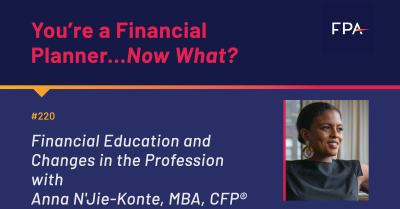
Discovering her passion for the profession
How did Anna get her start in the profession? She “completely fell into it by accident” and has loved it ever since.
“I always tell people that I didn't even know this was a real profession,” said Anna. “I knew vaguely that there were people that manage…’rich people's money’, but I didn't know that this is a thing that regular people did.”
After working as a private client assistant at a wealth management firm in New York, Anna moved to the DC area and began doing trust work and financial planning there, which is where she learned the ropes of the profession. It was also where she discovered she was good at it, and that she could make a positive impact on people’s lives through this work.
“I saw that by working one on one with people and really taking the qualitative aspects of their life and putting numbers to it...that I would be able to really alleviate a lot of stress and anxiety for people in terms of the unknown for their futures,” said Anna.
In addition, Anna wanted to be the best version of herself to her young kids, both by being an active, engaged parent and having control of her own business. She also wanted to serve communities of color and young women in a way that wasn’t beneficial in a traditional model.
The “missing piece” of the puzzle
Anna’s passion for the profession stems from her work with communities of color.
“I see how hardworking we are and how many advancements we’re making...but I find that the financial education piece is what really takes things to the next level,” said Anna. And I personally feel like it’s one of the missing pieces in our community.”
To improve, we can do two things: start financial education at a younger age, and better financial literacy for the public. Anna mentioned that Tyrone Ross, Jr. (who was a guest on the podcast in January) stated that children’s money beliefs and habits start to form by age seven. If their parents don’t have a great relationship with money, those negative habits and views can trickle down to their kids.
Lack of resources and role models can affect kids, too. When you don’t have people discussing investing, saving, or the basics of personal finance around kids, they may not be aware of what’s possible with money.
Children learn a lot simply from what they absorb through observation, so having these conversations is key to early financial literacy. To build on that, we need better education on personal finance, too.
“If they don’t have that basic knowledge, either from home or from the education system, how can we expect them to make better choices?” Anna pointed out. “I feel as though it's like we're chastising people for not knowing what nobody taught them.”
Is the profession ready for the next generation of clients?
“No. Short answer, one word answer: no,” said Anna.
She explained that the financial planning profession has a lot of thinking to do about how we want to move forward. Why has the profession ignored a huge segment of the population...and lost out on billions of dollars in revenue in the process?
“I think the financial services industry needs to be shaken up,” said Anna. “Because we are clinging to this AUM model and this actively managed portfolio model as the only way that we are compensated as advisors and it leaves out huge segments, growing segments of our population.”
On a smaller level, firms need to do better, too. If you have advisors who can’t understand or at least empathize with different cultural views of money, that makes it harder to align with their clients. And when advisors aren’t sensitive to or welcoming of cultural differences, they can’t serve their clients to the best of their ability.
That empathy for clients goes hand-in-hand with Anna’s advice for the next generation of planners. Understanding and liking the clients you serve will lead to successful long-term relationships.
“If you are going to talk to somebody three to four times a year for 15 years or 20 years, then you probably want to like them,” said Anna. “Nobody wants to have a client that you just don't see eye to eye with...it just isn't a good recipe for long term success.
What You’ll Learn:
- How Anna got into the profession
- Passion for financial planning
- Leading with education with clients
- Having money conversations early
- What drove Anna to found her own practice
- How her firm is structured
- Being confident and boldly unapologetic
- The future of the profession
- Why advisors need to understand a client’s money story
- Changing firm culture
- Anna’s advice for new planners
In this episode of YAFPNW, Ian and Anna discuss:
- Tyrone Ross, Jr. and early financial education
- Her podcast, First-Gen Realness
- “The case for accelerating financial inclusion in black communities”
Interested in following Anna? Follow her on LinkedIn and on Twitter at @anjiekonte
